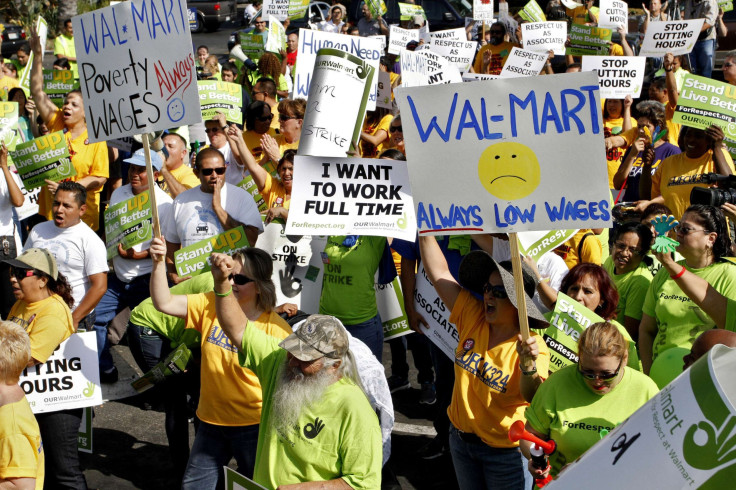In Labor Dispute, Wal-Mart Has One Powerful Weapon: Consumer Habits

Employees of Wal-Mart Stores Inc. (NYSE: WMT) preparing for protests up to and through the busiest shopping day of the year can expect to see legions of their fellow citizens rushing past their picket signs and into the stores to snatch up Black Friday deals in the annual bargain-hunting season that in years past has seen customers snatching, hissing and fighting like predatory cats on the Serengeti.
The Black Friday protests aren’t likely to put much of a dent to the company’s operations, which last year generated $15.8 billion in profit on a staggering $443 billion in revenue.
Despite recent labor union grumblings, Wal-Mart’s stock price has gained 15 percent since the start of the year; and loyal shareholders have been rewarded with $1.20 per share in dividends over the same period. Whatever Wal-Mart isn’t supposedly doing right by these disgruntled employees it is doing just fine in Wall Street's eyes. And consumers are deciding with their wallets that they’re OK with the company’s policies, whether it’s sourcing cheaply made products overseas, which American consumers expect and demand, or, as aggrieved workers have claimed, is tinkering with schedules that prevent employees from having a reliable and level income stream.
“Shoppers in the parking lot will say, ‘Oh, that’s terrible -- OK, where do I get my discounted electronics,’” Zev J. Eigen, an associate professor at Northwestern University School of Law who specializes in labor relations, told Bloomberg about the planned protests. “That’s one of the big challenges for the labor movement. We’ll sign online petitions, but we won’t vote with our wallets.”
But the behemoth of Bentonville isn’t taking any chances, especially after workers at the company’s major distribution center in Elwood, Ill., won a victory in October that led to improved working conditions, reinstatement of workers who said they were fired for complaining about conditions and reimbursement of wages lost during the three-week strike. The warehouse workers strike was part of a series of nationwide actions helped by the Warehouse Workers Organizing Committee.
Wal-Mart employees from Miami to Sacramento, Calif., recently participated in walkouts over what they say is wage theft (paying less than the legal minimum for actual time served), optimized scheduling (where hours for the day are determined by an algorithm that calculates sales for a given store on the same day the previous year, which some employees say raises and lowers hours in ways that challenges their ability to determine how much they will earn in any given pay period), and management retaliations for workers who voice grievances.
Wal-Mart denies any wrongdoing, and says the sentiments expressed by these workers are not shared by most of their estimated 1.6 million employees. Last week the company went to the National Labor Relations Board – the same body the warehouse workers went to with their complaints -- to declare this week’s planned protests a backhanded attempt by organized labor to unionize Wal-Mart employees.
The rare recourse for the retail giant to the very government agency often reviled by anti-union capitalists is being interpreted at worst as a shot across the bow against employees suspected of being union infiltrators and at best a sign the company is taking its recent labor problems more seriously.
“I don’t see this [the Black Friday protests] as translating into a great deal of success in terms of unionizing Wal-Mart or in terms of being particularly effective in improving conditions,” former NRLB Chairman William B. Gould told The New York Times. “But I must say if they’ve gone to the NRLB on this, that must show that Wal-Mart is really concerned.”
The protests are being orchestrated by the Organization United for Respect at Walmart (OUR Walmart), but it has union support, especially from United Food and Commercial Workers Union, and it’s the affiliation with collective bargaining that Wal-Mart says is the basis of its complaint.
“We are taking this action now because we cannot allow the UFCW to continue to intentionally seek to create an environment that could directly and adversely impact our customers and associates,” David Tovar, a Wal-Mart spokesman, said in an emailed statement to Bloomberg. “If they do, they will be held accountable.”
For its part, the UFCW says Wal-Mart has used its dominance to stamp out smaller competitors that offered better wages and benefits. Wage information for a company the size of Wal-Mart is difficult to obtain – it’s not a matter of public disclosure. But Bloomberg TV reported Monday that the average hourly full-time wage of a Wal-Mart employee is $12.57, or $26,145 a year before payroll deductions.
Work stoppages in the United States are at historic lows. They have been fewer than 100 a year since 1981 and considerably lower than the 1952 peak of 470 actions.
© Copyright IBTimes 2024. All rights reserved.






















